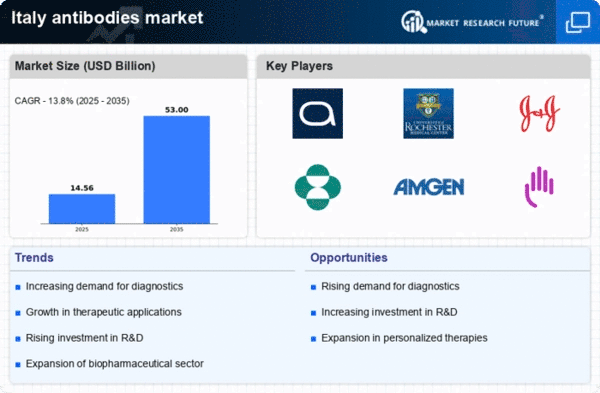Supportive Regulatory Environment
The supportive regulatory environment in Italy plays a pivotal role in fostering the antibodies market. Regulatory agencies are increasingly streamlining approval processes for antibody-based therapies, which encourages innovation and expedites market entry. Recent initiatives aimed at enhancing regulatory frameworks have reduced the time required for clinical trials and product approvals. This proactive approach not only benefits pharmaceutical companies but also ensures that patients have timely access to new therapies. As a result, the antibodies market is likely to expand, driven by the introduction of novel antibody products that meet the evolving healthcare needs of the Italian population.
Growing Investment in Biopharmaceuticals
The increasing investment in biopharmaceuticals is a significant driver for the antibodies market in Italy. The Italian government and private sector are channeling substantial funds into biopharmaceutical research and development, with a focus on innovative therapies. In 2025, it is estimated that biopharmaceutical investments will reach approximately €3 billion, reflecting a growing recognition of the potential of antibody-based treatments. This influx of capital is likely to facilitate the development of new antibody therapies, enhancing the overall market landscape. Furthermore, collaborations between academic institutions and industry players are expected to yield novel therapeutic candidates, thereby expanding the antibodies market in Italy.
Increasing Prevalence of Chronic Diseases
The rising incidence of chronic diseases in Italy is a crucial driver for the antibodies market. Conditions such as cancer, autoimmune disorders, and infectious diseases necessitate advanced therapeutic solutions. According to recent health statistics, chronic diseases account for approximately 70% of all deaths in Italy, highlighting the urgent need for effective treatments. This growing patient population is likely to propel the demand for antibody-based therapies, as they offer targeted treatment options with fewer side effects compared to traditional therapies. Consequently, pharmaceutical companies are increasingly focusing on developing innovative antibody therapies to address these health challenges, thereby expanding the antibodies market in Italy.
Rising Awareness of Personalized Medicine
The increasing awareness and adoption of personalized medicine are shaping the antibodies market in Italy. Patients and healthcare providers are increasingly recognizing the benefits of tailored therapies that consider individual genetic profiles. Antibody-based treatments, particularly monoclonal antibodies, are at the forefront of this trend, as they can be designed to target specific disease mechanisms. This shift towards personalized medicine is likely to drive demand for innovative antibody therapies, as they offer improved efficacy and safety profiles. As healthcare systems in Italy continue to embrace personalized approaches, the antibodies market is expected to experience substantial growth, driven by the need for customized treatment options.
Technological Advancements in Antibody Production
Technological innovations in antibody production are significantly influencing the antibodies market in Italy. Advances in recombinant DNA technology, hybridoma technology, and monoclonal antibody production have enhanced the efficiency and specificity of antibody development. For instance, the introduction of high-throughput screening methods has accelerated the identification of potential therapeutic antibodies. As a result, the production costs have decreased, making antibody therapies more accessible. The Italian biotechnology sector is witnessing a surge in investments aimed at harnessing these technologies, which could lead to a broader range of antibody products entering the market. This trend is expected to foster competition and drive growth within the antibodies market.
















